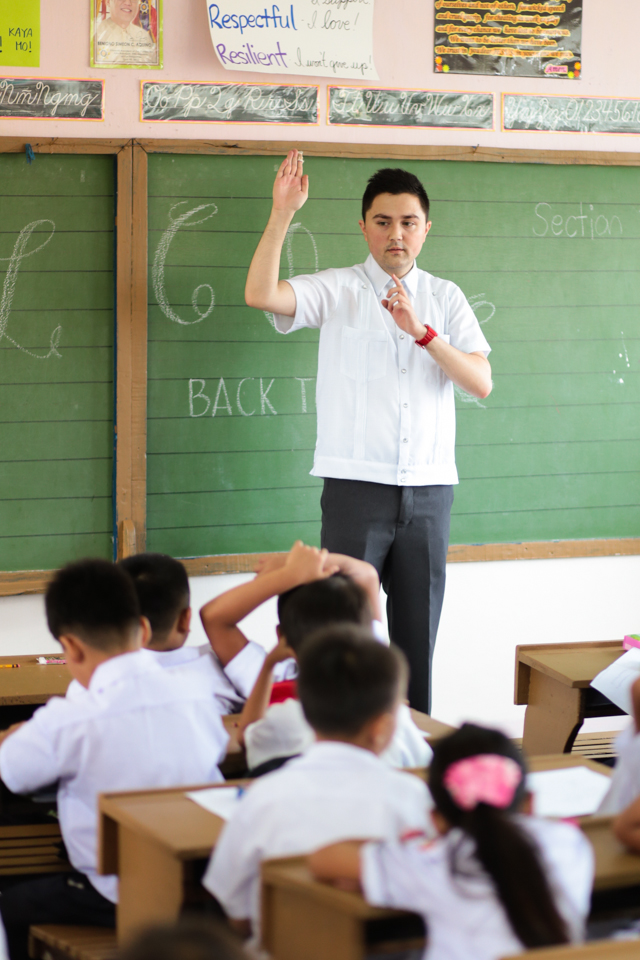One of my recent hobbies is walking through bookstores. More often than not, I pore through the pages of books with exciting titles or covers without buying anything. I think the guards at Fully Booked BGC are aware of this habit, though I’m not confident they receive it too well. People might find it surprising, considering that I generally love literature and am known more for teaching English than any other subject. However, like many of the students who used to fill (literally) my classroom, my attention span for reading is particular and limited, so getting me to actually invest in a book is quite a challenge. If the first five pages don’t convince me, the entire book definitely won’t. Coincidentally I read somewhere that the first five minutes of class are the most important in terms of student investment: if you can’t earn their interest in your lesson by then, you probably will be pulling metaphorical teeth out by the end of the hour.
Interestingly, the genre of literature which almost always convinces me to take a seat and read further is children’s literature. The artwork on the covers of these books is always very skillfully crafted and the stories are wonderful. Even with a short length and limited vocabulary, you can tell that the authors of these tales invest a great deal in the development of the characters they’ve crafted – oftentimes, in my opinion, to a better degree than those writing for young adults or not-so-young adults. As a “former” educator I also find myself inclined to this genre simply to see what kind of stories are captivating today’s youth – what topics previously verboten in literature and society are now innocuous, what sort of adventures children wish to embark on vicariously through fictional characters, and what sort of problems they wish they had assistance in solving.
Two Saturdays ago I found myself stuck in my place to complete a reread of Number the Stars, a book by Lois Lowry which was a universal favorite in my own Grade III classroom (what year that was, I refuse to divulge). In the book, Annemarie Johansen must draw upon every fiber of heroism in her body to ensure her Jewish friend’s family can be safely transported away from Denmark in the wake of Nazi terror. She relies on her faith in those she loves to get her through endless moments of uncertainty – even the fate of those she bids farewell is left ambiguous at the end of the story – and learns a great deal about what it means to lead with a moral compass.
When I finished reading, I gave the book its deserved respect and placed it back in its correct place on the shelf. I glanced at several other books nearby, some which were facing backward. A short but telling fragment of text caught my eye and nailed me to the floor: Meant for Grade 3-5, ages 8-11.
I had just finished a chapter book meant for the age range of my former students. But most if not all of my former students had not completed a chapter book written in any language. Most, if not all, of my former students had not completed a book so long due to lack of access. Some of my former students would find the feat impossible due to limited literacy and a tremendous dearth of self-confidence. And even though our class worked through its multiple adversities, the standard had been set. As I stared at the bookshelf, I felt defeated. With all our triumph, I wasn’t convinced I had done enough to help my students meet this standard.
Of course, this isn’t necessarily anybody’s fault. Teaching literacy is one challenge, but teaching it to a classroom of fifty plus is a completely different endeavor. How could a fifty minute block possibly fit enough time for comprehension checks, discussion of themes, and reaction processing for children who, for the 18 hours they are outside my jurisdiction, have a completely different set of priorities? I could not look any of my kids in the eye and tell them with honesty that they had failed, given the tremendous progress they made equally and individually. But I inculcated within them the value of honesty, and now I didn’t know if I had been completely honest when I neglected to inform them that they are working against circumstances set up to keep them disheartened.
The most I could do at the time was treat them like any other batch of students. Never mind if you are rich or poor – if you are in my classroom you are to participate and behave like a model citizen. There is little patience for less than your best and if your partner is falling, you have no right to claim you’re standing up. I am proud to report that all of my kids did well in their vow to adhere to my expectations, even if some slipped occasionally. Students who excelled early on helped those who needed an extra boost. Students who needed the extra boost would not waver in their resolve to get it done correctly. Everyone understood that success was measured in value to one’s self, to others, and to the country. Promotion in 2014 and 2015 were the hardest transitions, because as much as I wanted to guarantee a wealth of opportunities for my kids, no amount of effort could change the fact that struggle would continue to be part of their lives.
I have been away from my school for several months now and the questions pour in constantly, clouding my vision: Has Johnniel reneged on his promise to show up every day? Are people sticking up for Marcia when she’s being bullied? Do teachers allow Christian to use his surplus energy to help with classroom chores or do they simply send him outside? Does Keisha’s new teacher scaffold instead of asking her to stop answering the questions? Do they still believe they can do anything? Is someone around to tell them it’s possible? Who did we save? Who couldn’t we save?
At least there will always be Facebook to let me know that their English is improving. Or at least that they’ve warmed up to trying it out in between endless “Like for Satan, Share for Jesus” posts, pabebe waves, and pictures of the latest love-teams. The students who say hi during my weekly walks through KNL indicate they’re learning well and enjoying the process. There are kids who I thought I couldn’t reach that are now class leaders. Enrico couldn’t be bothered to open his notebook in July 2013; is that really him representing his advisory class in the pictures from this years International Day Pageant? Sheena’s written letters looked more like Egyptian hieroglyphics when I first met her; is that really her posting frequently in intelligible Tagalog on her Facebook profile? Did Phyllis really get elected Grade IV president without being from Section I?
Did I really help to make it all possible? If so, I must have done something right.
In Number the Stars, Annemarie moves vigorously, with little time to consider the consequences of her actions. Her concerns are selfless in the best way – knowing her bravery will help those she loves eclipses any fears she harbors regarding her situation. I think of my fellowship in the same way. I cannot count how many instances I acted completely on faith and impulse despite fear of reaction from multiple parties, aware that ultimately the welfare of my children outweighed whatever agenda they wished to push. I also can’t count how many days ended less than favorably – the times where I would sit staring blankly at the ceiling, wondering what more could be done to convince an unruly child it was worth sharing their time with me, how reasonable it was to start class at 6 when the sun’s not even up, what sort of lessons could really be digested if there wasn’t even sufficient food to digest, what more could any of us give when we’d already given all the love we could find and it still wasn’t a guarantee that any of these efforts would shift the power dynamic and allow all Philippine youth the potential to excel.
A quote that will follow me forever, which I’m sure my friends are growing weary of hearing me restate, is as follows: Are you prepared to never, ever, ever see the results of your work, but have faith that maybe your great-grandchildren’s great-grandchildren will? It’s a statement of conviction in the face of oblivion and without it I don’t think any of what we do is possible. And it gets me through moments like that which I had in the bookstore, where I had convinced myself that two years wasn’t enough to produce the change I wish to see. In that time, I did teach children to read. Maybe next year, one of them will go from reading sentences to paragraphs. The next year they could be reading books weekly or nightly. Perhaps they’ll transition from simply reading the sentences to challenging the content. One day in Grade VIII they might stumble upon an allegedly insurmountable issue which all books agree upon and vow to be the one to devise the solution. And when they realize that this country is replete with similar problems, maybe they’ll mobilize to create networks of people prepared to fight these issues head-on, just like our generation. One might become a senator. One could very well be the president. And if that passion to lead our people on the path to love and justice was borne from one hot afternoon where I wouldn’t allow students to go home until they had finished writing, does it not stand to reason that I, they, and we are all making the impact we so desperately need? And if we as a people can achieve something so seemingly impossible as taking children from the alphabet to hospitals, government offices, lecture halls, and laboratories, does it not stand to reason that as Filipinos, I-you-he-she-they-we can do anything?
Number the Stars derives its name from a psalm read by one of the book’s more willful characters midway through. A fragment of the psalm reads, “He heals the brokenhearted and binds up their wounds; He determines the number of the stars and calls them each by name.” While I wouldn’t dare be so blasphemous as to ever compare my character to the sanctity of a deity, I nevertheless contend that we as teachers are tasked to number the stars daily. We give names to concepts, we give names to faces in our history, and we give names to our students who may otherwise feel insignificant. As there are millions of stars in the sky to count, there are only so many children we can impact before our own time is up. I am confident that, though the “Sir Adam” chapter of my life may be over, there are others who will continue the work we’ve started and elevate it for the good of our people and the nation. We and they are the national heroes we have been waiting for.
Adam Rabuy Crayne, 20-secret, graduated with a BA in International Studies from the University of California – San Diego. He taught Grade III at Krus Na Ligas Elementary School in Quezon City from 2013-2015, and tries to visit on the weekends to make sure everyone’s still in line. He currently works at a public relations firm.


